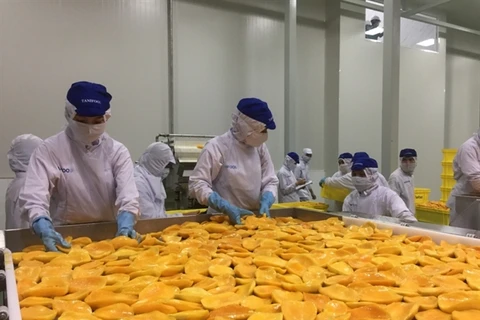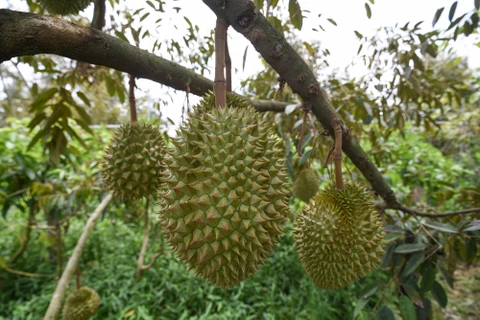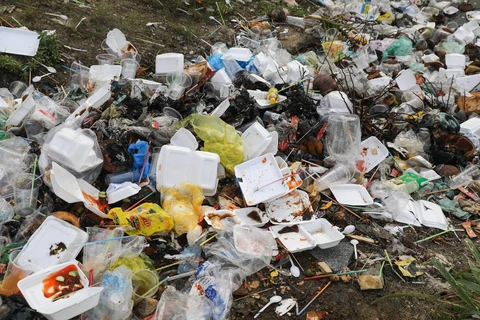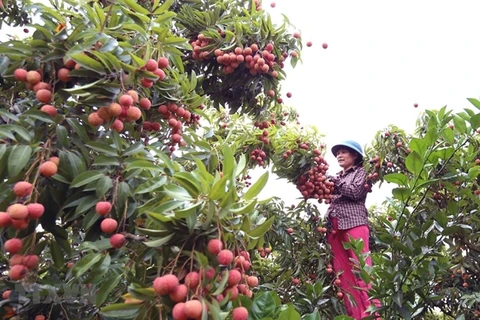Hanoi (VNS/VNA) - Good packaging can extend the storage life of agricultural produce and improve brand recognition, but not many firms are aware of such benefits.
Nguyen Minh Tien, director of the Vietnam Trade Promotion Centre for Agriculture, asserted that good packaging can protect and buffer a product from potential harm during warehousing and shipping. It also helps firms boost brand awareness and drive buying behaviours.
In Vietnam, the packaging of many products, including coffee, cashew and rice, involves the use of PP woven bags whereas some others require specific types such as water-proof PE-layered bags.
As consumers become increasingly design-conscious, their demand for eye-catching packaging rises. It is essential to develop new types of bags that create an emotional connection between products and consumers.
Environmental concerns should also be taken into account since consumers are shifting their buying behaviour towards sustainability. It is equally important to replace plastic bags with degradable paper-based bags.
Nguyen Ngoc Sang, chairman of the Vietnam Packaging Association (VPA), noted that packaging has reached a total global value of 500 billion USD with an annual growth rate of 12%. The rate tops 13% in Vietnam with over 4,500 bag manufacturers.
Bag manufacturing is not an easy task as consumers increasingly insist on higher standards for the product. Packaging bags need to be budget-friendly and attention-grabbing at the same time. Additionally, durability must come with environmental friendliness.
"Packaging should be smart to convey product information to consumers more easily," he added.
The chairman called for the use of bags to not only be eye-catching but also informative, which display in-depth information about local cultures.
A representative from Malu Design remarked that many global environmental campaigns, including Earth Hour and Make The World Cleaner, have become prominent in recent years, attracting a large number of participants.
A greener mindset has had a significant impact on buying habits. Notably, green bags have become a global trend and bans on plastic bags have been the order of the day in numerous countries.
In the US, San Francisco was the first city to put an end to plastic bags in large shops, reducing 1.4 million tonnes of plastic waste per year. In South Africa, the use of plastic bags could incur a fine of up to 13,800 USD. China followed suit in 2008.
"Plastic bags are cheap, convenient to use and familiar to consumers, yet detrimental to the environment and human health. Many bag manufacturers have switched to green ones," he said.
Huynh Thi Thu Hang, a VPA expert, underscored several characteristics that agricultural producers should be mindful of when they design packaging. She said the bags should be unique, eco-friendly, eye-catching, recyclable and connected with Vietnamese cultures.
Each bag of agricultural produce should contain a couple of smaller bags inside for food safety. The smaller bags should be designed in a way that they can be easily put into a gift box packed with items of different kinds./.
Nguyen Minh Tien, director of the Vietnam Trade Promotion Centre for Agriculture, asserted that good packaging can protect and buffer a product from potential harm during warehousing and shipping. It also helps firms boost brand awareness and drive buying behaviours.
In Vietnam, the packaging of many products, including coffee, cashew and rice, involves the use of PP woven bags whereas some others require specific types such as water-proof PE-layered bags.
As consumers become increasingly design-conscious, their demand for eye-catching packaging rises. It is essential to develop new types of bags that create an emotional connection between products and consumers.
Environmental concerns should also be taken into account since consumers are shifting their buying behaviour towards sustainability. It is equally important to replace plastic bags with degradable paper-based bags.
Nguyen Ngoc Sang, chairman of the Vietnam Packaging Association (VPA), noted that packaging has reached a total global value of 500 billion USD with an annual growth rate of 12%. The rate tops 13% in Vietnam with over 4,500 bag manufacturers.
Bag manufacturing is not an easy task as consumers increasingly insist on higher standards for the product. Packaging bags need to be budget-friendly and attention-grabbing at the same time. Additionally, durability must come with environmental friendliness.
"Packaging should be smart to convey product information to consumers more easily," he added.
The chairman called for the use of bags to not only be eye-catching but also informative, which display in-depth information about local cultures.
A representative from Malu Design remarked that many global environmental campaigns, including Earth Hour and Make The World Cleaner, have become prominent in recent years, attracting a large number of participants.
A greener mindset has had a significant impact on buying habits. Notably, green bags have become a global trend and bans on plastic bags have been the order of the day in numerous countries.
In the US, San Francisco was the first city to put an end to plastic bags in large shops, reducing 1.4 million tonnes of plastic waste per year. In South Africa, the use of plastic bags could incur a fine of up to 13,800 USD. China followed suit in 2008.
"Plastic bags are cheap, convenient to use and familiar to consumers, yet detrimental to the environment and human health. Many bag manufacturers have switched to green ones," he said.
Huynh Thi Thu Hang, a VPA expert, underscored several characteristics that agricultural producers should be mindful of when they design packaging. She said the bags should be unique, eco-friendly, eye-catching, recyclable and connected with Vietnamese cultures.
Each bag of agricultural produce should contain a couple of smaller bags inside for food safety. The smaller bags should be designed in a way that they can be easily put into a gift box packed with items of different kinds./.
VNA
























